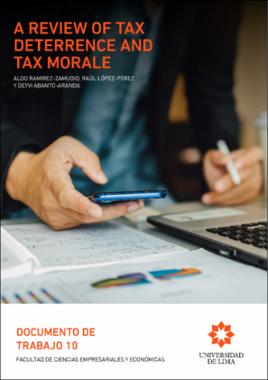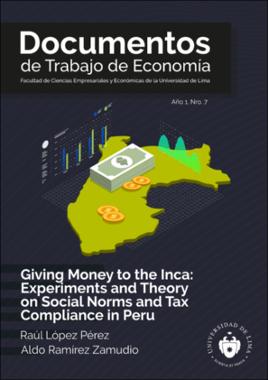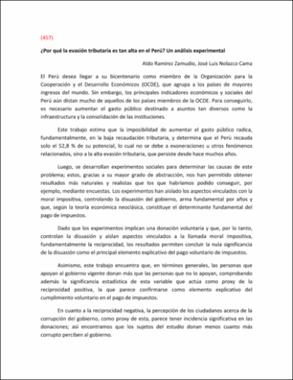Browsing by Author "Ramirez Zamudio, Aldo Fabricio"
Now showing items 1-9 of 9
-
A review of tax deterrence and tax morale
Ramirez Zamudio, Aldo Fabricio; López-Pérez, Raúl; Abanto Aranda, Deyvi Franco (Universidad de Lima, Facultad de Ciencias Empresariales y Económicas, 2021)This work reviews theory and empirical evidence, first of the seminal neoclassical model of taxation from Allingham and Sandmo (1972) and then of “Tax Morale” which is the broad concept that groups taxpayer’s non-pecuniary ... -
An experimental test of two policies to increase donations to public projects
López Pérez, Raúl; Ramirez Zamudio, Aldo Fabricio (Elsevier, 2020)Acceso abiertoThis paper uses lab-in-the-field experiments and theory to explore why people give money to gov-ernments. We assume that giving is motivated by outcome–oriented or consequentialist norms, andconditional on (a) others’ ... -
Assessment of fiscal effort and voluntary tax compliance in Peru
Ramirez Zamudio, Aldo Fabricio; Nolazco Cama, José Luis (Universidad Católica de Colombia, 2020)Acceso abiertoThis study examines the fiscal effort and voluntary compliance in the payment of taxes in Peru, given that in 2014, the Peruvian economy collected only 52.8% of its total tax potential. Through an experiment, the research ... -
Efecto imitación y cumplimiento tributario en el pago de impuestos
Ramirez Zamudio, Aldo Fabricio (Universidad de Lima, Instituto de Investigación Científica, 2017)Acceso abiertoLa investigación intenta demostrar que el efecto imitación entre personas (peer effect) representa un factor psicológico importante que afecta el cumplimiento voluntario en el pago de impuestos. Asimismo, se propone ... -
Giving Money to the Inca: Experiments and Theory on Social Norms and Tax Compliance in Peru
López Pérez, Raúl; Ramirez Zamudio, Aldo Fabricio (Universidad de Lima, Facultad de Ciencias Empresariales y Económicas, 2019)Acceso abiertoWe report data from an experiment in Peru where subjects anonymously decide how much of their endowment they donate to the Peruvian government. The standard rational choice model and several well-known models of non-selfish ... -
Lessons from COVID’S Vaccination: External-Internal Frictions and Efficiency
Ramirez Zamudio, Aldo Fabricio; Sánchez Dávila, Elmer (MDPI, 2023)Acceso abiertoThis paper explores some economic variables that determine the emerging of new COVID-19 variants and the determinants of vaccination advances in 108 countries during a quarterly period from March 2020 to March 2022. We ... -
Un modelo simple de cumplimiento tributario y algunas reglas de política
Ramirez Zamudio, Aldo Fabricio; López Pérez, Raúl (Universidad de Lima, Instituto de Investigación Científica, 2018)Acceso abiertoLa investigación estima el impacto de cuatro reglas diferentes de política sobre el cumplimiento voluntario del pago de impuestos. Para ello, se ha contemplado diseñar un modelo experimental que permita testear la ... -
¿Por qué la evasión tributaria es tan alta en Perú? Un análisis experimental
Ramirez Zamudio, Aldo Fabricio; Nolazco Cama, José Luis (Universidad de Lima, 2016)Acceso abiertoEl Perú desea llegar a su bicentenario como miembro de la Organización para la Cooperación y el Desarrollo Económicos (OCDE), que agrupa a los países de mayores ingresos del mundo. Sin embargo, los principales indicadores ... -
Value Added Tax: Do Enforcement Mechanisms Improve Compliance?
Ramirez Zamudio, Aldo Fabricio (Universidad de Lima, 2015)Acceso abiertoValue Added Tax (VAT) is one of the main sources of internal revenues in Peru and most countries in Latin America. Since the market in Peru shows a high heterogeneity in terms of fi rms’ size and their economic transactions, ...





